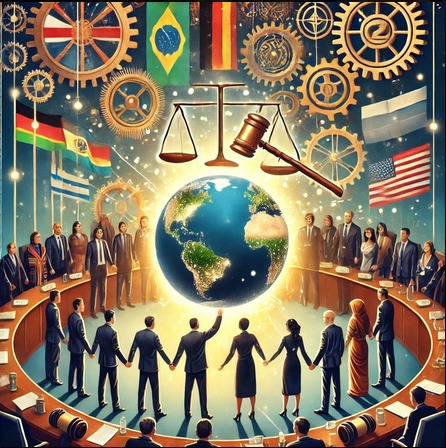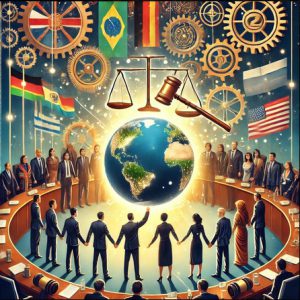G20 Leading by Example in the Fight Against Corruption
G20 Leading by Example in the Fight Against Corruption

G20 Leading by Example in the Fight Against Corruption
The Group of Twenty (G20), representing the world’s major economies, has increasingly positioned itself as a key player in the global fight against corruption. By adopting stringent policies, promoting international cooperation, and setting an example for both developed and developing countries, the G20 has demonstrated its commitment to curbing corruption in both public and private sectors.
The Role of the G20 in Combating Corruption
Corruption has long been one of the most significant barriers to economic development and social justice worldwide. It hinders economic growth, exacerbates inequality, and undermines public trust in institutions. The G20, composed of the world’s largest economies, has the power and resources to drive meaningful reforms and set a global standard for anti-corruption efforts.
The G20’s fight against corruption has evolved over the years, with leaders emphasizing transparency, accountability, and strong governance mechanisms. Through various initiatives, such as the Anti-Corruption Action Plan, the G20 has taken substantial steps toward tackling corruption at the highest levels.
Key G20 Anti-Corruption Initiatives
1. Global Standards for Transparency and Accountability
One of the central tenets of the G20’s approach to fighting corruption is the promotion of transparency and accountability within both public institutions and the private sector. The G20 has led by example in encouraging countries to implement transparent public procurement processes, disclose political donations, and make public officials’ assets accessible for scrutiny.
The G20 has also endorsed initiatives like the Open Government Partnership, which encourages governments to commit to transparency, citizen participation, and anti-corruption reforms. By championing these reforms, the G20 creates an environment where countries are more likely to implement and adhere to anti-corruption standards.
2. Combatting Illicit Financial Flows
The fight against illicit financial flows (IFFs) has become a key focus of G20 anti-corruption efforts. IFFs include money that is transferred across borders illegally, often involving bribes, embezzlement, tax evasion, and other forms of financial misconduct.
The G20 has taken a firm stance against IFFs by promoting stronger financial regulations, improving cross-border information sharing, and encouraging countries to adopt stricter anti-money laundering (AML) laws. International bodies like the Financial Action Task Force (FATF) have been key partners in these initiatives, ensuring that global financial institutions are equipped to detect and prevent the flow of illicit funds.
3. Strengthening the Role of Civil Society
Civil society plays a critical role in exposing corruption and holding governments accountable. The G20 has increasingly recognized the importance of empowering civil society organizations (CSOs) in anti-corruption efforts. By supporting CSOs, the G20 helps create a network of watchdogs that can track corruption, report abuses, and advocate for policy changes.
In addition to supporting civil society, the G20 has worked to ensure that whistleblower protection laws are strengthened in member countries. Whistleblowers often expose corruption at great personal risk, and robust legal protections are crucial to encourage more individuals to come forward without fear of retaliation.
Strengthening Global Cooperation
The G20 is not working alone in the fight against corruption. One of its greatest strengths lies in its ability to foster global cooperation on anti-corruption measures. By bringing together the world’s most powerful nations, the G20 facilitates dialogue and action on anti-corruption policies.
The G20 has partnered with international organizations such as the United Nations Office on Drugs and Crime (UNODC) and the OECD Anti-Corruption Network to create coordinated global efforts. These partnerships ensure that anti-corruption measures are consistent across borders and that countries are held accountable for their actions on the global stage.
Additionally, the G20 plays a pivotal role in setting the 2030 Agenda for Sustainable Development, which includes a commitment to fighting corruption as part of the broader goal of promoting peace, justice, and strong institutions. By aligning its anti-corruption efforts with global development objectives, the G20 is ensuring that the fight against corruption is an integral part of international progress.
The Importance of Political Will
While the G20 has made significant strides in the fight against corruption, the success of its initiatives depends on political will from its member countries. Corruption is deeply entrenched in many societies, and without the full commitment of national governments, anti-corruption policies will struggle to gain traction.
In this regard, the G20 has emphasized the need for strong political leadership to drive reforms. It has encouraged member countries to adopt comprehensive national anti-corruption strategies, ensure the independence of anti-corruption bodies, and build public support for transparency and accountability.
Challenges and the Road Ahead
Despite the G20’s progress, significant challenges remain in the global fight against corruption. The lack of consistent enforcement of anti-corruption laws, the use of political power to shield corrupt practices, and the difficulty of tracking illicit financial flows all continue to hinder efforts to eradicate corruption.
However, the G20’s leadership provides a critical foundation for continued progress. By continuing to prioritize anti-corruption measures, encouraging global cooperation, and setting a high standard for transparency and accountability, the G20 is helping to shape a future where corruption no longer thrives unchecked.
Conclusion
The G20’s commitment to fighting corruption sends a powerful message to the world: corruption will not be tolerated, and the global community must work together to eliminate it. Through transparency, accountability, and international cooperation, the G20 is setting an example that other nations can follow.
As the world moves forward, the G20’s leadership in anti-corruption efforts will be crucial to achieving a more just and equitable global society. By staying committed to these efforts and pushing for even more ambitious reforms, the G20 can continue to lead the way in the global fight against corruption.
________________________________________
SEO Words: G20 anti-corruption, global corruption fight, illicit financial flows, transparency and accountability, political will, financial regulations, civil society and corruption.G20 Leading by Example in the Fight Against Corruption
The Group of Twenty (G20), representing the world’s major economies, has increasingly positioned itself as a key player in the global fight against corruption. By adopting stringent policies, promoting international cooperation, and setting an example for both developed and developing countries, the G20 has demonstrated its commitment to curbing corruption in both public and private sectors.
The Role of the G20 in Combating Corruption
Corruption has long been one of the most significant barriers to economic development and social justice worldwide. It hinders economic growth, exacerbates inequality, and undermines public trust in institutions. The G20, composed of the world’s largest economies, has the power and resources to drive meaningful reforms and set a global standard for anti-corruption efforts.
The G20’s fight against corruption has evolved over the years, with leaders emphasizing transparency, accountability, and strong governance mechanisms. Through various initiatives, such as the Anti-Corruption Action Plan, the G20 has taken substantial steps toward tackling corruption at the highest levels.
Key G20 Anti-Corruption Initiatives
1. Global Standards for Transparency and Accountability
One of the central tenets of the G20’s approach to fighting corruption is the promotion of transparency and accountability within both public institutions and the private sector. The G20 has led by example in encouraging countries to implement transparent public procurement processes, disclose political donations, and make public officials’ assets accessible for scrutiny.
The G20 has also endorsed initiatives like the Open Government Partnership, which encourages governments to commit to transparency, citizen participation, and anti-corruption reforms. By championing these reforms, the G20 creates an environment where countries are more likely to implement and adhere to anti-corruption standards.
2. Combatting Illicit Financial Flows
The fight against illicit financial flows (IFFs) has become a key focus of G20 anti-corruption efforts. IFFs include money that is transferred across borders illegally, often involving bribes, embezzlement, tax evasion, and other forms of financial misconduct.
The G20 has taken a firm stance against IFFs by promoting stronger financial regulations, improving cross-border information sharing, and encouraging countries to adopt stricter anti-money laundering (AML) laws. International bodies like the Financial Action Task Force (FATF) have been key partners in these initiatives, ensuring that global financial institutions are equipped to detect and prevent the flow of illicit funds.
3. Strengthening the Role of Civil Society
Civil society plays a critical role in exposing corruption and holding governments accountable. The G20 has increasingly recognized the importance of empowering civil society organizations (CSOs) in anti-corruption efforts. By supporting CSOs, the G20 helps create a network of watchdogs that can track corruption, report abuses, and advocate for policy changes.
In addition to supporting civil society, the G20 has worked to ensure that whistleblower protection laws are strengthened in member countries. Whistleblowers often expose corruption at great personal risk, and robust legal protections are crucial to encourage more individuals to come forward without fear of retaliation.
Strengthening Global Cooperation
The G20 is not working alone in the fight against corruption. One of its greatest strengths lies in its ability to foster global cooperation on anti-corruption measures. By bringing together the world’s most powerful nations, the G20 facilitates dialogue and action on anti-corruption policies.
The G20 has partnered with international organizations such as the United Nations Office on Drugs and Crime (UNODC) and the OECD Anti-Corruption Network to create coordinated global efforts. These partnerships ensure that anti-corruption measures are consistent across borders and that countries are held accountable for their actions on the global stage.
Additionally, the G20 plays a pivotal role in setting the 2030 Agenda for Sustainable Development, which includes a commitment to fighting corruption as part of the broader goal of promoting peace, justice, and strong institutions. By aligning its anti-corruption efforts with global development objectives, the G20 is ensuring that the fight against corruption is an integral part of international progress.
The Importance of Political Will
While the G20 has made significant strides in the fight against corruption, the success of its initiatives depends on political will from its member countries. Corruption is deeply entrenched in many societies, and without the full commitment of national governments, anti-corruption policies will struggle to gain traction.
In this regard, the G20 has emphasized the need for strong political leadership to drive reforms. It has encouraged member countries to adopt comprehensive national anti-corruption strategies, ensure the independence of anti-corruption bodies, and build public support for transparency and accountability.
Challenges and the Road Ahead
Despite the G20’s progress, significant challenges remain in the global fight against corruption. The lack of consistent enforcement of anti-corruption laws, the use of political power to shield corrupt practices, and the difficulty of tracking illicit financial flows all continue to hinder efforts to eradicate corruption.
However, the G20’s leadership provides a critical foundation for continued progress. By continuing to prioritize anti-corruption measures, encouraging global cooperation, and setting a high standard for transparency and accountability, the G20 is helping to shape a future where corruption no longer thrives unchecked.
Conclusion
The G20’s commitment to fighting corruption sends a powerful message to the world: corruption will not be tolerated, and the global community must work together to eliminate it. Through transparency, accountability, and international cooperation, the G20 is setting an example that other nations can follow.
As the world moves forward, the G20’s leadership in anti-corruption efforts will be crucial to achieving a more just and equitable global society. By staying committed to these efforts and pushing for even more ambitious reforms, the G20 can continue to lead the way in the global fight against corruption.
________________________________________





